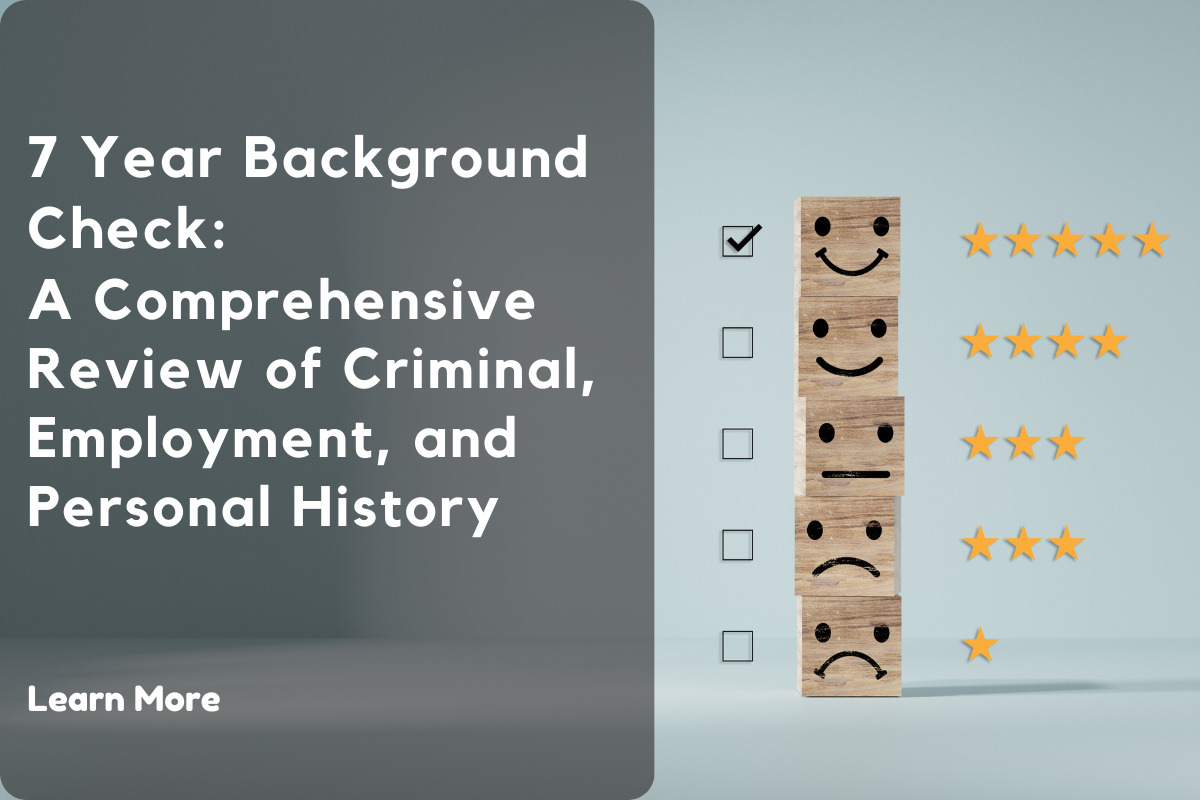What is a 7-Year Background Check?
A 7-year background check is a standard process used by employers, landlords, and other institutions to evaluate an individual’s criminal, financial, and employment history over a seven-year period. This process provides a snapshot of a person’s background, revealing any past offenses, bankruptcies, or employment discrepancies that could impact their eligibility for employment, housing, or other opportunities. The seven-year timeframe is significant because it is a legally recognized period for which certain records, such as criminal convictions, are typically accessible for employment and other screening purposes.
What is Included in a 7-Year Background Check?
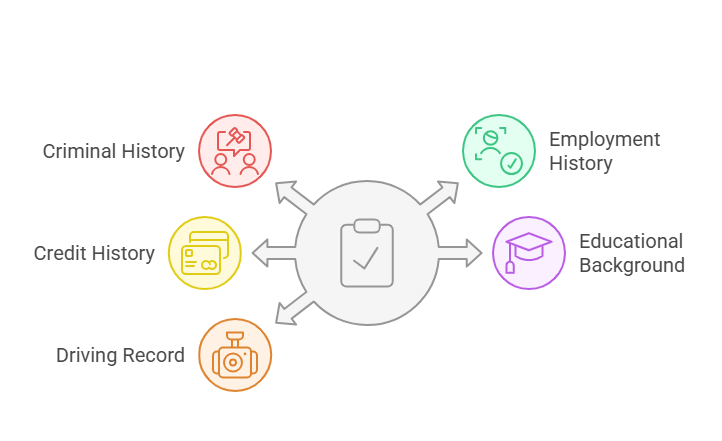
A 7-year background check typically encompasses several key components that help employers and other organizations assess the risk associated with a candidate. The details covered in a background check may vary depending on the industry, but the most common areas of investigation include:
- Criminal History:
This is one of the most significant aspects of a background check. It includes any criminal convictions or arrests within the past seven years. Criminal records may reveal information about felonies, misdemeanors, or arrests, which could influence an employer’s decision. However, certain minor infractions may not be included, depending on local laws. - Employment History:
A 7-year background check typically verifies the employment history of an individual, especially if the person has worked in multiple jobs during the past seven years. Employers often look for discrepancies in job titles, employment dates, or reasons for leaving past positions. - Credit History:
A credit check may be part of the background screening process, especially for positions that involve financial responsibilities or handling company funds. A 7-year credit report includes details such as bankruptcies, outstanding debts, credit scores, and other financial behaviors. - Educational Background:
The check may also verify the candidate’s educational qualifications and credentials. This ensures that applicants have the degrees or certifications they claim to possess. In some cases, this verification can extend back more than seven years, depending on the organization’s requirements. - Driving Record:
For jobs that require driving, the background check might also include a motor vehicle record (MVR) to check for violations, suspensions, or accidents within the last seven years. This is particularly important for positions like truck drivers, delivery drivers, and other roles that involve operating a vehicle.
Why is the 7-Year Period Used?
The 7-year period is significant because it aligns with several legal guidelines governing the use of background checks for employment purposes. There are a few reasons why the seven-year timeframe is particularly relevant:
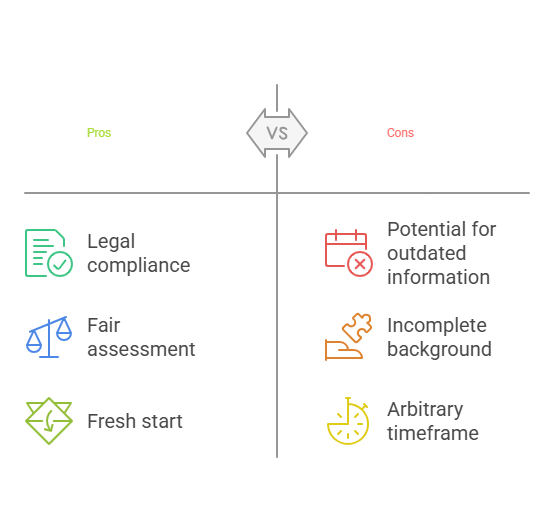
- Fair Credit Reporting Act (FCRA):
In the United States, the Fair Credit Reporting Act (FCRA) limits how far back certain records can be reported. Specifically, the FCRA restricts criminal background checks to records within the past seven years for most employment-related background screenings, unless the position involves high-level security clearance or certain other factors. The law is designed to protect candidates from being unfairly discriminated against based on distant criminal records. - State and Local Laws:
Many states and local jurisdictions have laws that restrict the types of records that can be accessed during background checks. For example, some states limit the reporting of criminal convictions that occurred more than seven years ago, while others may exclude records such as arrests that did not lead to convictions. The seven-year limit ensures compliance with these legal standards. - Relevance and Practicality:
The seven-year period is often considered long enough to allow for meaningful insights into an individual’s background without overly penalizing them for past mistakes. For instance, a conviction for a crime that happened 15 or 20 years ago may not be as relevant to a job application as one from the recent past. The seven-year window strikes a balance between fair assessment and providing candidates with a reasonable opportunity for a fresh start.
Industries and Situations Where a 7-Year Background Check is Commonly Required
7-year background checks are widely used in various industries and sectors, especially those that involve sensitive information, high security, or public safety. The following industries commonly require background checks to protect both the organization and its stakeholders:
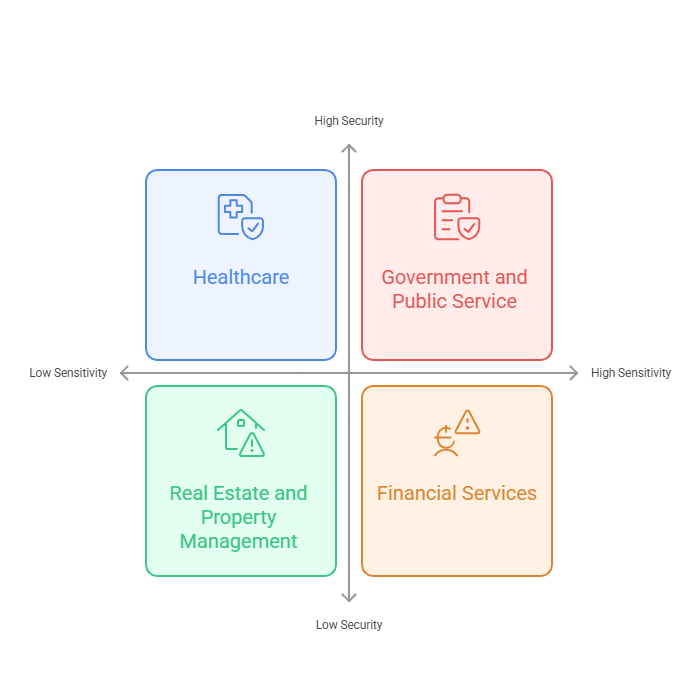
- Healthcare:
Employers in the healthcare industry often require background checks to ensure that potential employees have no history of malpractice, substance abuse, or criminal activity that could harm patients. Healthcare providers and institutions must comply with regulations that mandate criminal background checks, especially for roles involving direct patient care. - Financial Services:
In industries like banking, insurance, and investment, background checks are essential for positions that handle large sums of money or access confidential financial data. Financial institutions commonly require a 7-year background check to assess whether candidates have any history of fraud, financial mismanagement, or criminal activity related to finance. - Government and Public Service:
Many government agencies, particularly those that deal with national security, require thorough background checks, including criminal history, credit reports, and past employment. Positions that involve sensitive government operations or access to classified information typically necessitate a comprehensive check that spans at least seven years. - Transportation and Logistics:
Employers in the transportation sector, such as trucking companies or airlines, conduct 7-year background checks to evaluate the safety records and driving histories of their employees. This helps ensure that drivers and other transportation personnel do not have a history of reckless driving, accidents, or violations that could endanger passengers or cargo. - Education:
Schools, universities, and other educational institutions often require background checks for prospective employees to ensure that they do not have any criminal records that would disqualify them from working with minors. Teachers, administrators, and other staff members are frequently subjected to background checks to safeguard students. - Real Estate and Property Management:
Property management companies often conduct 7-year background checks on potential tenants to assess their financial responsibility and criminal history. This helps landlords screen applicants and minimize the risk of renting to individuals who may cause damage to the property or fail to meet financial obligations.
The Significance of the 7-Year Period: Legal and Practical Aspects
The 7-year period for background checks is crucial not only for legal compliance but also for making fair and practical decisions. From a legal perspective, it helps organizations navigate the complex landscape of federal, state, and local regulations regarding background checks. Practically, it provides a reasonable window to assess an applicant’s suitability for a role without punishing them for past mistakes that may no longer be relevant.
Moreover, this period allows individuals to demonstrate personal growth and rehabilitation. For example, a person who committed a non-violent crime 10 years ago may have since turned their life around and become a valuable asset to a company. The 7-year period allows employers to assess the current situation of the applicant while considering their past.
The 7-year rule also serves to protect both employers and employees from potential bias. By limiting the scope of the background check, it reduces the possibility of discrimination based on irrelevant or outdated information.
Data and Statistics
Recent statistics indicate that background checks are increasingly becoming a standard part of the hiring process. According to a survey by the National Association of Professional Background Screeners (NAPBS), over 90% of employers in the United States conduct some form of background screening before making a hiring decision. Among those, nearly 70% perform criminal background checks, often adhering to the 7-year limitation.
Additionally, data from the Society for Human Resource Management (SHRM) shows that employers report a significant drop in hiring risks when they use background checks as part of their employment process. This highlights the effectiveness of a 7-year background check in identifying issues that might otherwise go unnoticed.
The Process, Benefits, and Challenges of a 7-Year Background Check
In this section, we’ll dive into the process of conducting a 7-year background check, explore the benefits for both employers and employees, and address common challenges or misconceptions associated with it. Additionally, we’ll touch on how services like RapidHireSolutions can assist with employment screening and background checks, providing a streamlined and reliable solution for businesses.
The Steps Involved in Conducting a 7-Year Background Check
Conducting a 7-year background check is a systematic process that involves multiple steps to ensure that the information collected is accurate and relevant to the decision-making process. The procedure typically follows these steps:
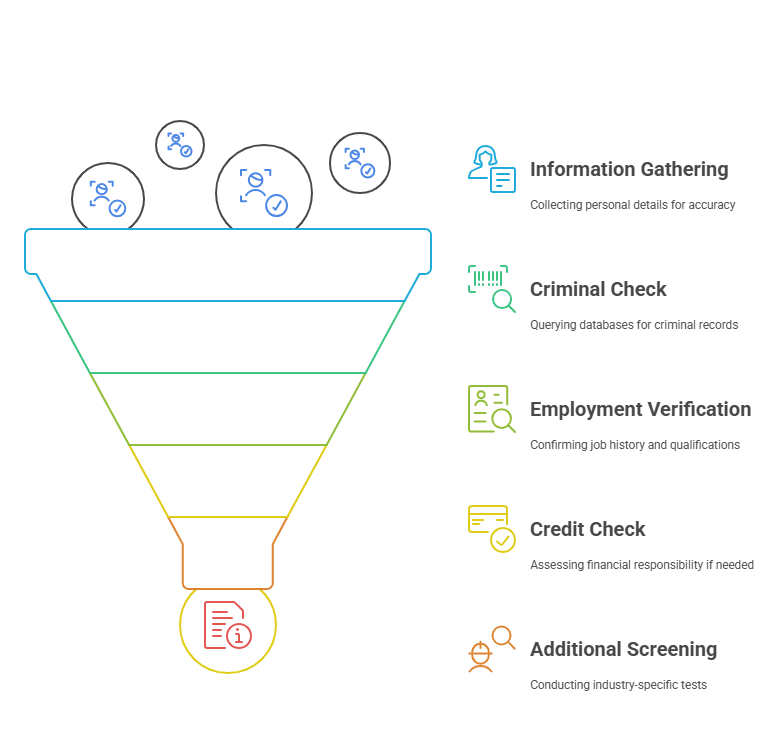
- Permission from the Candidate:
Before any background check is conducted, the candidate must provide explicit written consent. This is not only a legal requirement but also a best practice in ensuring transparency and compliance with privacy laws. Employers must also notify candidates about the type of background checks they plan to conduct and the scope of the information being gathered. - Gathering Information:
Once consent is obtained, the employer or screening service will begin gathering the candidate’s personal details, including full name, date of birth, current address, and any previous addresses. This step ensures that the check covers the correct individual and helps in tracing any relevant records from the past seven years. - Criminal Background Check:
This is the most common and crucial part of the 7-year background check. The process typically involves querying multiple databases to identify criminal records from local, state, and federal authorities. Depending on the jurisdiction, it may include felony and misdemeanor convictions, pending charges, and in some cases, arrest records. However, under the Fair Credit Reporting Act (FCRA), certain types of information, like arrests that did not result in a conviction, may not be reported if they fall outside the 7-year window. - Employment and Education Verification:
The background check often involves verifying the candidate’s employment history and educational qualifications. For employment verification, the screening service will contact previous employers to confirm job titles, employment dates, and reasons for leaving. For educational verification, institutions may be contacted to confirm the candidate’s degrees, certifications, or other credentials. - Credit History Check (If Applicable):
If the role involves handling finances or sensitive information, a credit history check may be included. This includes reviewing the candidate’s credit report to assess their financial responsibility. The check will typically cover the last seven years of financial history, including bankruptcies, foreclosures, and outstanding debts. - Drug Testing and Other Screening:
Depending on the industry, additional screenings may be required, such as drug tests, driving records (for transportation-related positions), or professional licensing verification. These screenings vary by job type but may be integrated into the overall background check process. - Review of Results:
Once all the data has been gathered, the results are compiled and presented in a report. This report will include all relevant findings from the criminal background, employment history, credit report, and any other screenings conducted. The employer can then review the information to make an informed decision about the candidate.
Benefits for Employers and Employees
Conducting a 7-year background check offers significant benefits to both employers and employees. Let’s explore some of the key advantages for each group:
Benefits for Employers:
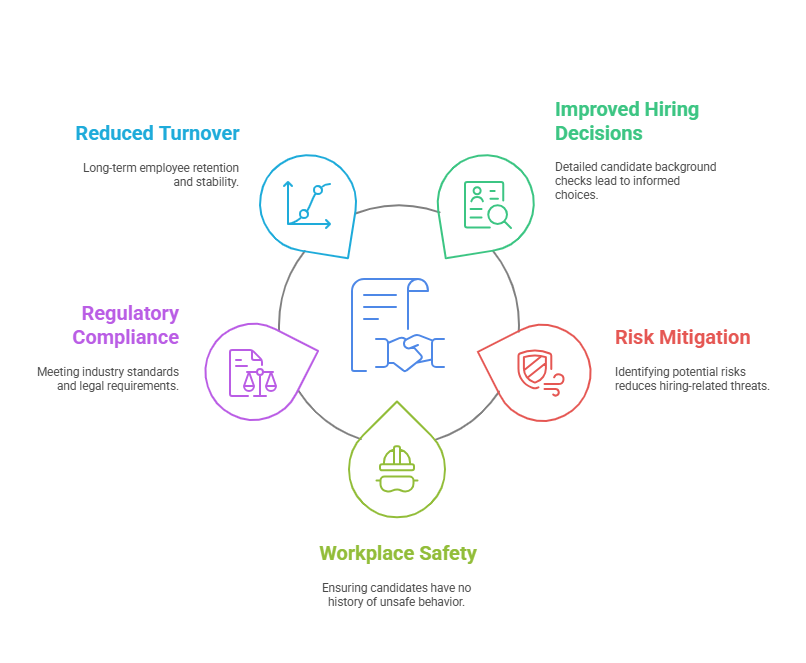
- Improved Hiring Decisions:
A 7-year background check provides a detailed and comprehensive picture of a candidate’s background, allowing employers to make more informed decisions. By uncovering any criminal history, employment discrepancies, or financial issues, employers can better assess whether the candidate is a good fit for the job. - Risk Mitigation:
By conducting a thorough background check, employers can mitigate the risk of hiring individuals with past criminal activity or other issues that could pose a risk to the company or its employees. This is especially important in industries that handle sensitive data, finances, or public safety, where the stakes are higher. - Enhanced Workplace Safety:
Ensuring that candidates do not have a history of violent or unsafe behavior can create a safer work environment. This is particularly important in industries such as healthcare, construction, and manufacturing, where employees are often in close proximity to each other and the public. - Compliance with Industry Regulations:
Many industries, including healthcare, finance, and education, require background checks as part of regulatory compliance. By conducting a 7-year background check, employers ensure that they meet these legal requirements and avoid potential penalties or liabilities. - Reduced Turnover and Liabilities:
Employers who make more informed hiring decisions tend to experience lower turnover and fewer legal disputes. A thorough background check can help identify candidates who are likely to stay with the company long-term and avoid hiring individuals who may be a liability in the future.
Benefits for Employees:
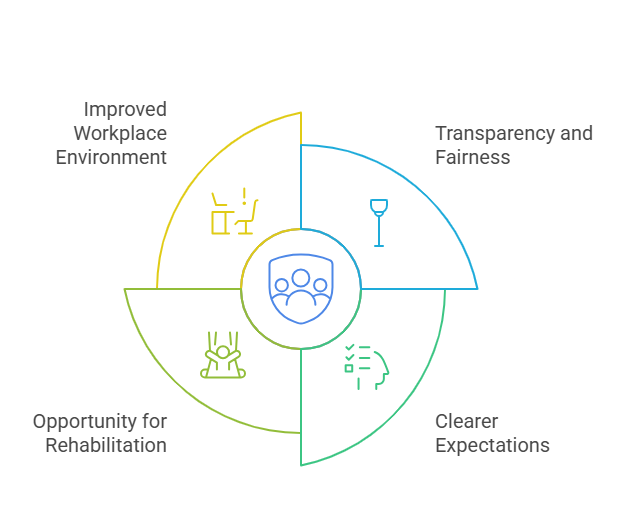
- Transparency and Fairness:
For candidates, a 7-year background check provides transparency and allows them to present their history accurately. This can give candidates an opportunity to explain any past mistakes or criminal convictions in a way that may not be evident from just the criminal record. - Clearer Expectations:
Employees can benefit from knowing that employers are conducting background checks based on standardized and regulated procedures. This creates a level playing field where candidates are evaluated based on consistent criteria. - Opportunity for Rehabilitation:
A 7-year background check provides candidates with a reasonable opportunity for rehabilitation. If they have a criminal record, they may have had time to demonstrate positive changes in their life, which can be a deciding factor in hiring decisions. - Improved Workplace Environment:
By conducting thorough background checks, employers contribute to a safer and more secure work environment, which benefits everyone. Employees can feel more comfortable working alongside colleagues who have passed comprehensive background screenings.
Common Concerns and Misconceptions
While 7-year background checks offer many advantages, there are some common concerns and misconceptions that both employers and candidates may have. Let’s address some of these:
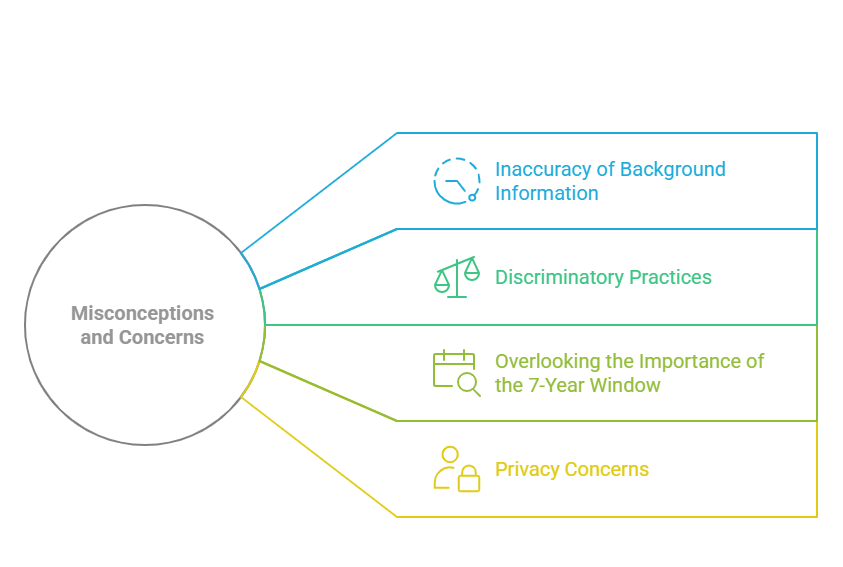
- Inaccuracy of Background Information:
One of the most common misconceptions is that background checks are always 100% accurate. In reality, records can sometimes be incomplete or outdated. Employers should ensure that the background screening service they use is reliable and that candidates are given a chance to dispute any inaccuracies. - Discriminatory Practices:
Some candidates worry that a background check could be used to unfairly discriminate against them, especially if they have past criminal convictions. While employers must comply with Equal Employment Opportunity (EEO) laws, candidates are encouraged to be transparent about their history and provide context where necessary. - Overlooking the Importance of the 7-Year Window:
The 7-year window is often misunderstood. Some candidates may believe that the background check is only concerned with criminal convictions, but it also covers employment history, financial status, and more. Understanding this broader scope helps candidates prepare for what will be reviewed. - Privacy Concerns:
Background checks can raise concerns about privacy. Employers must comply with data protection regulations and ensure that personal information is kept confidential and only used for the intended purpose of making a hiring decision. Candidates should also be informed about their rights to privacy before the background check process begins.
About RapidHireSolutions and Our Background Check Services
RapidHireSolutions offers comprehensive background check services designed to streamline and simplify the hiring process for employers. Specializing in pre-employment screening, RapidHireSolutions provides fast, reliable, and accurate background checks, including criminal history, employment verification, credit reports, and drug testing. Their user-friendly platform allows employers to easily request, track, and manage background checks for potential hires, ensuring compliance with industry regulations. By leveraging RapidHireSolutions, businesses can mitigate risks, make informed hiring decisions, and maintain a safe, compliant workplace.
Comparing 7-Year Background Checks with Other Types
To help you understand the differences between various types of background checks, here’s a comparison of 7-year checks with other common background check durations.
| Type of Background Check | Scope | Cost | Effectiveness | Typical Use |
|---|---|---|---|---|
| 7-Year Background Check | Criminal history, employment, credit, etc. | Moderate | Most comprehensive | Standard for most employers |
| 5-Year Background Check | Criminal history, limited employment info | Lower | Less detailed | Entry-level jobs, positions with fewer requirements |
| 10-Year Background Check | Extensive criminal and employment history | Higher | Most thorough | High-security roles, sensitive positions |
The 7-year background check is a balanced choice for most employers, offering comprehensive data without being overly intrusive.
Legal Aspects, FAQs, and Conclusion of a 7-Year Background Check
In this section, we will explore the legal aspects surrounding 7-year background checks, focusing on compliance and privacy concerns. We will also answer some frequently asked questions (FAQs) to clear up common doubts and conclude the article by summarizing the importance of proper employment screening practices.
Legal Requirements and Regulations Surrounding 7-Year Background Checks
Background checks are governed by various federal, state, and local laws to ensure that employers and other organizations conduct these checks fairly and legally. The 7-year period is especially significant in light of several key regulations:
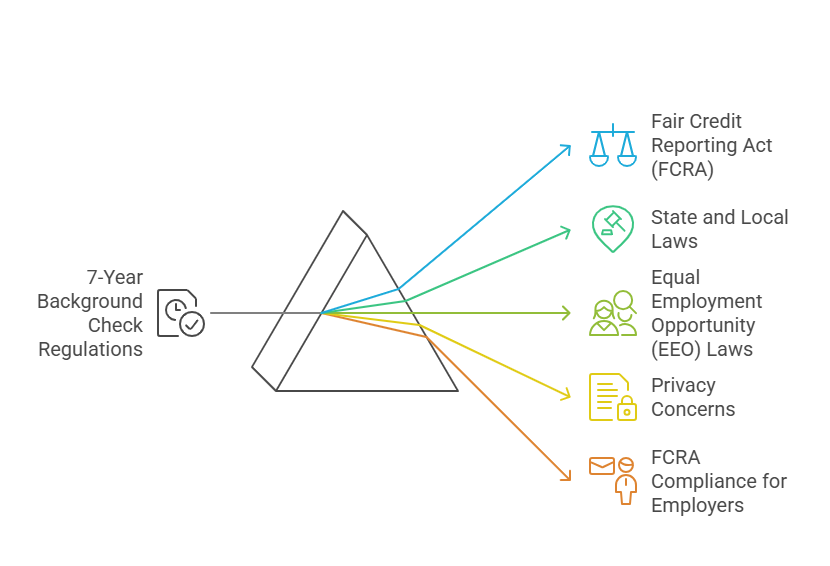
- Fair Credit Reporting Act (FCRA): The Fair Credit Reporting Act (FCRA) plays a major role in determining how background checks are conducted in the United States. Under the FCRA, there are strict guidelines on how far back criminal convictions can be reported. Specifically, the law limits reporting of most criminal records to 7 years for employment-related background checks. However, there are exceptions, particularly when the role requires a high level of security clearance or involves significant financial responsibility. The FCRA also mandates that candidates give consent before a background check is conducted and that they are informed of the results.
- State and Local Laws: States and local jurisdictions may have additional rules regarding background checks. For example, some states have “ban the box” laws, which prohibit employers from asking about criminal history on initial job applications. Instead, the background check is typically done later in the hiring process. Furthermore, some states limit how far back certain criminal records can be considered, particularly for low-level offenses or offenses that have been expunged or sealed. It’s important for employers to stay informed of these regulations to ensure they remain in compliance.
- Equal Employment Opportunity (EEO) Laws: Employers must be cautious not to engage in discriminatory practices when using background checks. According to the Equal Employment Opportunity Commission (EEOC), employers must ensure that their background check processes do not disproportionately impact individuals from certain racial, ethnic, or gender groups. For instance, if a criminal conviction is used as a basis for disqualifying candidates, employers must ensure that the decision is relevant to the position and that the applicant’s circumstances have been taken into consideration.
- Privacy Concerns: Privacy laws also come into play when conducting background checks. Employers are required to maintain confidentiality when handling sensitive personal information and must only use the data for employment-related decisions. Some candidates may have concerns regarding the access to their personal details, especially for credit or criminal background checks. Employers must follow data protection laws, which vary by region but typically require the candidate’s consent and proper handling of their information to ensure it is not misused or disclosed to unauthorized parties.
- FCRA Compliance for Employers: Employers must provide candidates with the Notice of Negative Action if they decide not to hire someone based on information found in a background check. If a candidate is rejected because of criminal records, credit issues, or other findings from the background check, the employer is obligated to notify the candidate and provide them with an opportunity to dispute the information. This process helps prevent employers from making unfair decisions based on inaccurate or incomplete information.
FAQs: Common Questions about 7-Year Background Checks
Here are five frequently asked questions related to 7-year background checks, with concise answers:
What does a 7-year background check include?
A 7-year background check typically includes criminal history, employment verification, educational credentials, and sometimes credit history or driving records, depending on the role. It covers any records within the last seven years, ensuring that only relevant and recent information is considered.
Can employers see records older than seven years?
In most cases, employers cannot access criminal records or other information older than seven years, as per the FCRA. However, certain records, like violent felonies or convictions involving large sums of money, may be reported if they’re relevant to the job. Additionally, some states allow for reporting beyond seven years, especially for high-security or financial positions.
How long do background check results take to process?
The length of time required for a 7-year background check varies depending on the type of check and the jurisdiction. In general, it can take anywhere from a few days to a few weeks for results to be processed. If the check involves verification from multiple sources, such as employers or educational institutions, it may take longer.
Can I dispute information found in my background check?
Yes, candidates can dispute any inaccurate or incomplete information found during the background check process. If you believe that a criminal record, employment history, or financial detail is incorrect, you can contact the background screening company or the reporting agency to correct the information.
Does a criminal record automatically disqualify me from employment?
Not necessarily. While certain criminal convictions, especially for violent crimes, can be a disqualifying factor for some jobs, employers must follow specific guidelines to ensure they are not unfairly discriminating. Many employers will give candidates a chance to explain their past and consider their rehabilitation or the relevance of the offense to the position before making a final decision.
Conclusion
A 7-year background check plays a critical role in ensuring that both employers and employees can make informed decisions. For employers, it provides an essential tool to assess the suitability of candidates, mitigate potential risks, and ensure compliance with industry regulations. For candidates, it offers transparency and a fair opportunity to explain their history, promoting equal opportunities in the hiring process.
As businesses increasingly rely on background checks to maintain workplace safety, legal compliance, and operational efficiency, understanding the legal aspects of these checks and the potential benefits is key. It’s important for employers to stay informed about the latest regulations, ensure compliance, and maintain fairness in their screening practices. At the same time, candidates should be proactive in understanding their rights and ensuring that their background checks are accurate and up-to-date.
Incorporating thorough and legally compliant background checks into your hiring process is not just about reducing risk but also about fostering a culture of transparency, trust, and responsibility. With services like RapidHireSolutions, businesses can streamline their background check processes, ensuring that they make the best possible hiring decisions based on reliable and accurate information.
By understanding the scope and limitations of a 7-year background check, both employers and employees can navigate the hiring process more confidently and effectively, leading to better outcomes for all parties involved.

